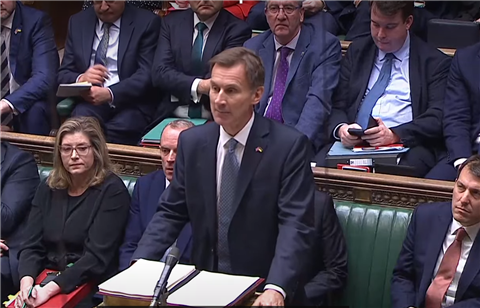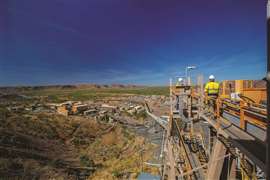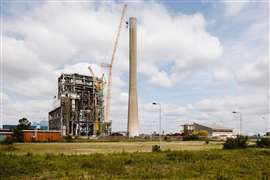We’re ‘not very good’ at infrastructure, says UK government
17 November 2022
In his Autumn Statement, the UK’s chancellor of the exchequer, Jeremy Hunt, announced that spending on the country’s largest rail and energy projects would be maintained.
He said, “When looking for cuts, capital is sometimes seen as an easy option, but doing so limits not our budgets but our future.” He went on to say that nothing would be cut from the government’s capital budgets.
The chancellor announced spending of almost €700 billion over the next five years, for capital projects.
 UK Chancellor of the Exchequer Jeremy Hunt unveiling his Autumn Statement
UK Chancellor of the Exchequer Jeremy Hunt unveiling his Autumn Statement
At the same time – and in answer to a question about the unprecedented budget for the country’s mammoth High Speed 2 (HS2) rail project – he admitted that, “the increases in budget for HS2 are disappointing but I think a strong economy needs to have consistency of purpose and that means saying that we will make sure that we are a better connected country and the lack of those connections is one of the fundamental reasons for the differences in wealth between north and south which we are so committed to addressing.”
He added, though, that “there is a bigger issue about the way that we do infrastructure projects: it takes too long, budgets therefore get out of control and we’re just not very good at it and we have to sort it out.”
In a statement that generally spared some of the largest infrastructure projects in the country, Hunt said construction of the Sizewell C nuclear power station in Suffolk would proceed, with a government investment of almost €800 million.
He said the project is set to create 10,000 skilled jobs, as well as delivering low-carbon energy to as many as six million UK households.
Industry’s response
Following the statement, Kevin Minton, chief executive of the Construction Plant-hire Association (CPA) said, “In what will be challenging economic times, it is welcome that the government has committed to Hinkley Point C, HS2, the East West rail link and Northern Powerhouse Rail.
“This echoes our call for the Autumn Statement to provide stability and confidence for the construction sector, utilising construction as a driver of economic growth. The construction plant-hire industry has a critical role to play in these projects.”
Angus Duguid of the architecture firm HKS, was equally sanguine, saying, “It was widely anticipated the Autumn Statement would bring a landslide of capital spending cuts and we are pleased to see that this is not the case and there has in fact been a recommitment to large infrastructure projects including the New Hospital Programme.
“It’s also positive to see a keen focus on energy efficiency. It’s now key to ensure funding is directed to make buildings more operationally efficient in terms of their energy usage.”
Thomas Vandecasteele, managing director of Legendre UK, a French family-owned construction company with offices in London and Jersey, responded to the statement, saying, “We positively welcome the news that capital investment will remain intact and key infrastructure projects will go ahead as planned.
“However, given the current challenging global climate, what our industry needs is a skilled workforce to deliver these projects. The shortage of workers in the UK is severe due to an ageing workforce and the struggle to attract young people into the industry.
“The Autumn Statement recognises the importance of providing individuals with training programmes and apprenticeships and it’s good to see financial incentives to make these more desirable. The Government now needs to ensure it works collaboratively with construction companies to increase the number of schemes and delineate a strategy to boost the number of apprenticeships in our sector.”
A voice of dissent came from Rahul Kejriwal, CEO of construction software firm Bricsys.
He said, “Five years ago, the 2017 Made Smarter Review promised investment in industrial design technology [IDT] would boost productivity, add £455 billion GVA [gross value added], reduce CO2 emissions by 4.5% and create 175,000 new jobs over a decade.
“Investments in open source, flexible technologies could have been the saving grace for the construction industry - but the impact of this review has not been felt and the budget doesn’t go far enough to advance or protect the construction and manufacturing businesses, which together make up 16% of the UK’s GVA.”
Suneeta Johal, chief executive of the UK’s Construction Equipment Association (CEA), said, “We welcome the Government’s decision to proceed with a new nuclear power plant at Sizewell C, which will help to provide reliable low-carbon power. This new power plant will create 10,000 skilled jobs, however, there was no mention of the chronic skills shortage we are already facing.
“The sector is struggling to recruit people – due to competition but also a lack of awareness and perceptions among younger generations. There is significant work to be done on this and the CEA continues to feed back to Government through its position on the National Manufacturing Skills Taskforce.”
STAY CONNECTED


Receive the information you need when you need it through our world-leading magazines, newsletters and daily briefings.
CONNECT WITH THE TEAM











